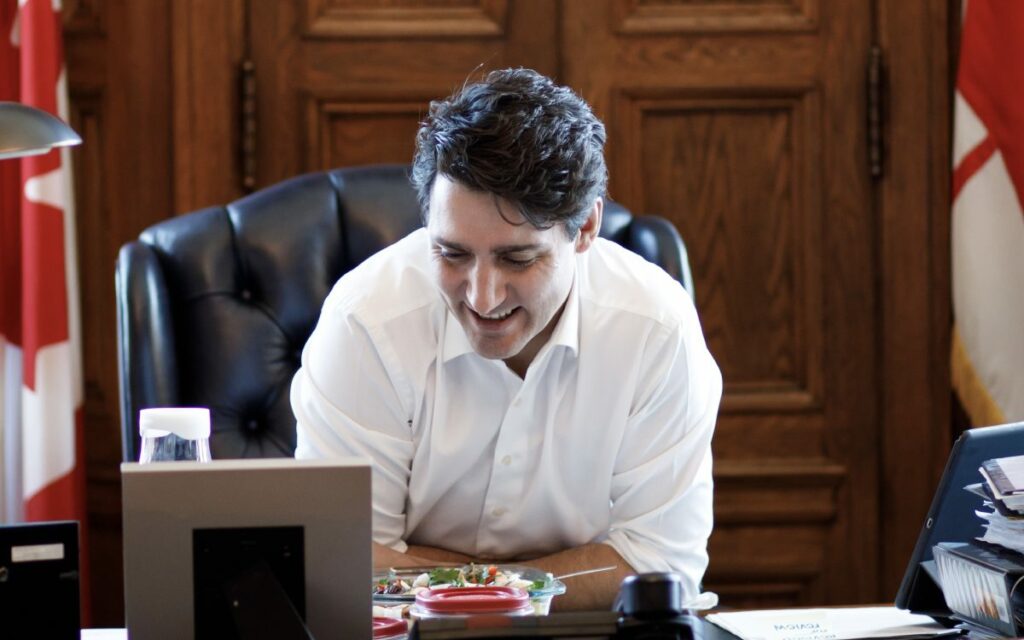
Prime Minister Justin Trudeau’s summer facelift has yet to manifest itself and caucus members are getting antsy. Pictured: Prime Minister Justin Trudeau. Photo Credit: Justin Trudeau/X.
The Liberals have thrown everything but the kitchen sink at the wall over the last six months in the hopes of seeing what, if anything, can be done to salvage their sinking electoral prospects.
We’ve seen it all at this point. Billions of dollars spent in the last federal budget. Deployment of a dozen cabinet ministers to campaign in the doomed riding of Toronto-St. Paul’s. A flurry of international trips under the guise of Team Canada.
There was also the desperate smear job of a website released last week against Conservative Leader Pierre Poilievre, attempting to paint him as someone with a record of “making life harder for middle-class Canadians.”
Good luck to all current parliamentarians and future candidates who show up at the doorsteps to sell that message to the voting public.
None of these measures have thus far proven to be a winner. Prime Minister Justin Trudeau’s summer facelift has yet to manifest itself and caucus members are getting antsy.
The good news for Trudeau is that the summer isn’t over just yet. The bad news is that several critical moments still stand to sink him further into the black hole of negative media coverage.
First, we may find ourselves with a rail strike on our hands. A critical decision is coming down the pipe next week from the Canada Industrial Labour Board, which will issue a ruling as to whether some rail shipments could continue to be deemed essential in the event a labour disruption occurs.
The mind immediately conjures up last summer’s strike at the Port of Vancouver, which resulted in billions of dollars in lost economic activity. If a rail strike proceeds, expect that it is going to put the Trudeau government in a very tough position with labour unions as well as the businesses and Canadians whose livelihood relies on the successful transportation of goods and services from coast to coast.
Not only would there be economic and political ramifications for the government in charge of managing this crisis, but an extended strike could result in the need for back-to-work legislation to be put on the table by the Trudeau government.
In this scenario, the NDP, who are tied to the Liberals through the supply and confidence agreement, will also have to calculate whether it’s time to finally sever ties. If they choose to continue with the pact and carry out the terms of the agreement, the NDP risks losing a core constituency by carrying water for the Liberals.
Then there are the next series of by-elections set to take place in Quebec and Manitoba. The Liberals will be fighting to defend their seat in the heart of Montreal and while the seat in Winnipeg is expected to be duked out by the Conservatives and the NDP, Trudeau can’t afford to cede further electoral ground.
In the event of another defeat, the government will not be able to recapture the narrative when it comes to laying out its priorities ahead of the fall session. Instead, the conversation will be focused squarely on the failings of the governing party.
As we saw in the US, a lot can happen in a few weeks and there is a lot of risk here for Trudeau, who insists on staying in the ring.

Josie Sabatino is a Senior Consultant at Summa Strategies, focused on providing strategic insight and helping clients meet their objectives in an ever changing and complex political and regulatory environment. Prior to joining Summa, Josie spent nearly a decade in political communications and most recently served as the Director of Communications to the Hon. Erin O’Toole, former Leader of the Official Opposition.






